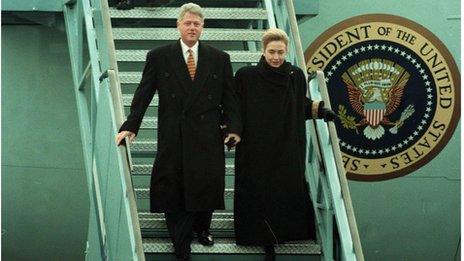Hillary Clinton's connections to NI peace process
- Published
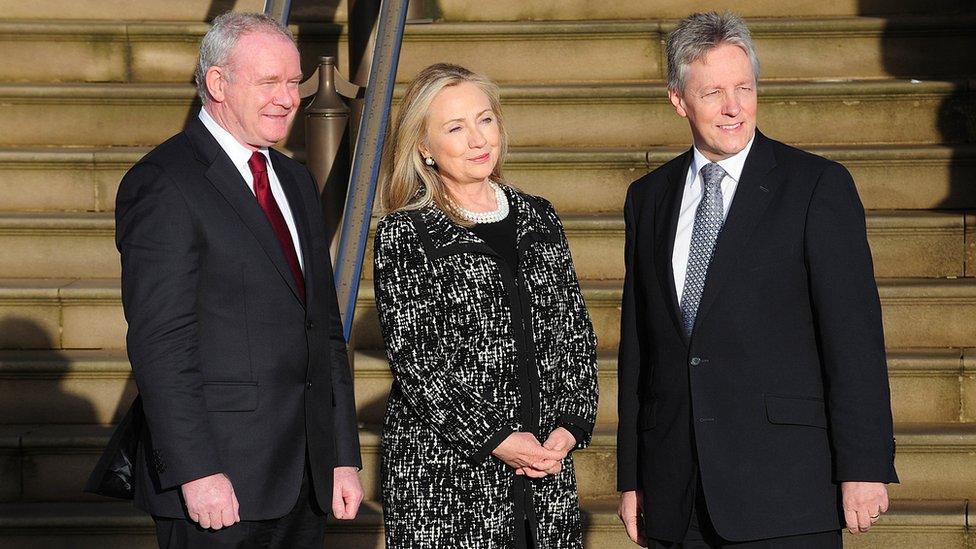
Hillary Clinton has met Northern Ireland leaders on numerous occasions, both as First Lady and later as US secretary of state
Defeated presidential candidate Hillary Clinton first came to Northern Ireland 21 years ago at a crucial time in the peace process.
On 30 November 1995, external, she accompanied her husband Bill Clinton to Belfast, as he became the first serving US president to visit Northern Ireland.
The couple were mobbed by well-wishers on both sides of the sectarian divide as they visited the Shankill and Falls.
They literally lit up the city, as they switched on its Christmas lights.
'Inspiration'
The couple's first trip to Northern Ireland was hugely symbolic, encouraging hope and reconciliation at a time of fraught political negotiations.
In Londonderry, the reception was even more enthusiastic, with crowds waving a sea of US flags in Guildhall Square, chanting: "We want Bill!"
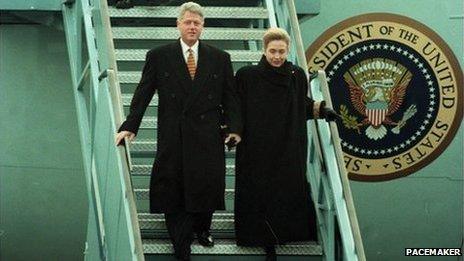
President Bill Clinton and First Lady Hillary Clinton made their first visit in 1995
A year earlier, Mr Clinton had taken a political risk by granting Sinn Féin's leader Gerry Adams a US visa, and during his Belfast trip, he controversially shook hands with him on the Falls Road.
Mrs Clinton, too, took a hands-on approach to peace-building.
She famously dropped into the Lamplighter cafe on Belfast's Ormeau Road where she met a group of Catholic and Protestant women involved in cross-community work.
During the encounter, the then First Lady was presented with a teapot by peace campaigner Joyce McCartan - who had lost several family members in the Troubles.

In 1995, Hillary Clinton bonded over tea with Belfast peace campaigner Joyce McCartan
The teapot was reportedly brought back to the US and used in the White House.
Mrs Clinton described Mrs McCartan as an "inspiration" and has recalled the Lamplighter cafe anecdote many times in subsequent speeches about Northern Ireland.
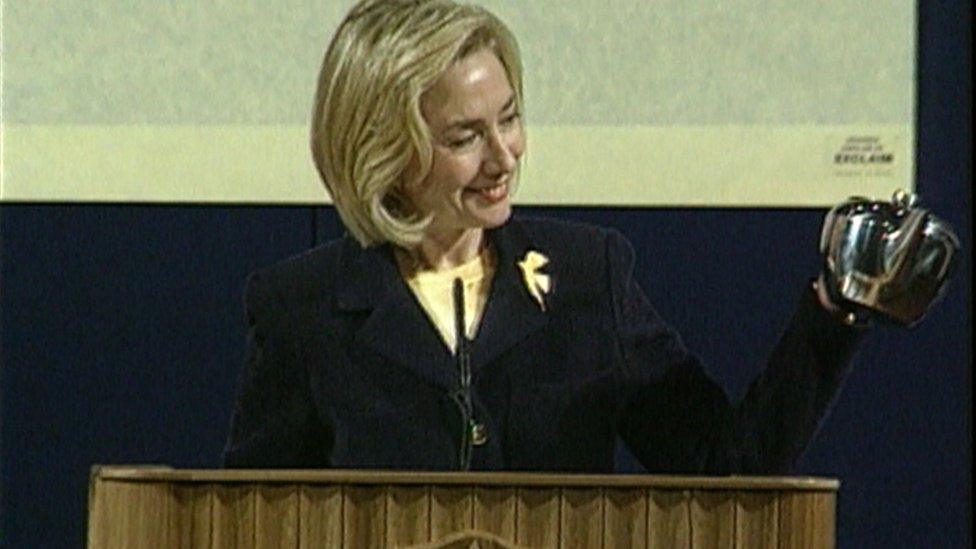
Hillary Clinton kept the teapot she was given in Belfast and has referred to it many times
The peace campaigner died about a month after the meeting, but when Ulster University honoured her with the Joyce McCartan memorial lecture two years later, Mrs Clinton returned for a solo visit to Northern Ireland to deliver the inaugural speech.
Scandal
In 1998, the Clinton family was rocked by Bill Clinton's admission of an extra-martial affair with White House intern Monica Lewinsky.
Later that year, and under intense personal scrutiny, Mrs Clinton chose Northern Ireland as the location for her first public speech since the scandal broke, external.
Addressing a Women in Democracy conference, she received a standing ovation as she spoke about the rights and achievements of women in public life.
"If you listen you can hear the voices of women who withstood jeers and threats to make themselves heard in a political world once reserved primarily for men," Mrs Clinton said.
The couple's 1998 visit had a very sombre tone, taking place just weeks after the Omagh bomb claimed the lives of 29 people, including a woman pregnant with twins.
The Clintons travelled to Omagh to meet and sympathise with some of those bereaved by the Real IRA explosion.
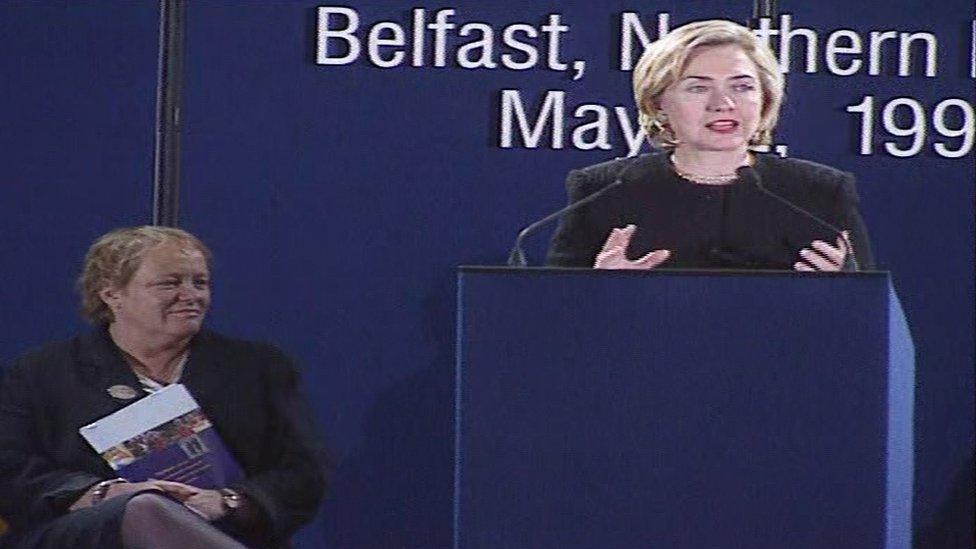
Hillary Clinton shared a stage with the late NI secretary of state, Mo Mowlam, in 1999
The First Lady returned to Northern Ireland the following year, without her husband, to reiterate the Clinton administration's ongoing support for the peace process.
Booed
She met the then First Minister David Trimble and Deputy First Minister Seamus Mallon.
By 2004. Northern Ireland was hosting its eighth Clinton visit, and perhaps it was a sign that patience was wearing thin as the couple were booed as they left the Clinton Peace Centre in Enniskillen, County Fermanagh.
It was not that they were no longer welcome in the town - the boos were from spectators who were disappointed when the couple left without the usual meet-and-greet contact that had been the highlight of previous visits.
Four years later, when Mrs Clinton was challenging Barack Obama for the 2008 Democratic presidential nomination, she cited Northern Ireland as one example of her greater foreign policy experience.
However, she was criticised for "exaggerating" her role in the peace process after she told CNN: "I helped to bring peace to Northern Ireland."
Forced to defend her comments, she said: "I actually went to Belfast more than Bill did, as part of what I was doing to help the process."
'Cheerleader'
Her critics included former Northern Ireland First Minister David Trimble, who dismissed her claims as a "wee bit silly".
"I don't know there was much she did apart from accompanying Bill [Clinton] going around," Lord Trimble said at the time.
"I don't want to rain on the thing for her, but being a cheerleader for something is slightly different from being a principal player."
But Lord Trimble's fellow Nobel Peace Prize winner, SDLP leader John Hume who is a long-time friend of the Clintons, defended her contribution.
"I am quite surprised that anyone would suggest that Hillary Clinton did not perform important foreign policy work as first lady," Mr Hume said in 2008.
'True friend'
When she became America's top diplomat the following year, Mrs Clinton returned to Belfast to address the Northern Ireland Assembly, external.
She told MLAs that US investment had helped to create about 20,000 jobs in Northern Ireland since the early days of the peace process in 1994.

US Secretary of State Clinton officially reopened the refurbished Belfast City Hall during a visit to the city in 2009
Secretary of State Clinton also appointed an economic envoy to Northern Ireland on behalf of the US government.
Stormont's Deputy First Minister Martin McGuinness said Mrs Clinton had been "a true friend" to Northern Ireland.
She was back in 2012 but this time her trip coincided with the start of the union flag dispute, and Mrs Clinton was once again condemning violence on the streets.
She challenged political leaders to tackle sectarianism and political divisions at a grassroots level.
"What we have to do is get out of the ballrooms, out of Stormont and into the communities where people live, where they do not have that lasting hope of optimism," she said.
After giving her a personal tour of the newly built Titanic centre, the then First Minister Peter Robinson defended the peace process, saying "this ship is not going down".

US Secretary of State Hillary Clinton addressed a business lunch at Titanic Belfast in 2012
Last year, Mrs Clinton was inducted into the Irish America Hall of Fame and used her speech to praise the role of women in cementing the Northern Ireland peace process.
She said she was accepting the honour "on behalf of all the remarkable women that I met and admired in Northern Ireland".
- Published17 March 2015
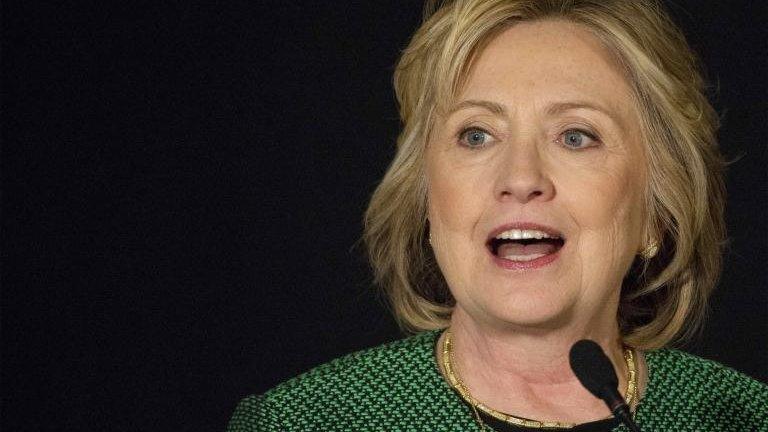
- Published18 January 2013
